Peter MALONE
Saturday, 18 September 2021 19:33
Dead Ringer
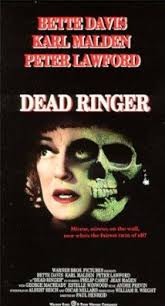
DEAD RINGER
US, 1964, 116 minutes, Black and white.
Bette Davis, Karl Malden, Peter Lawford, Philip Carey, Jean Hagen, Estelle Winwood, George Chandler, Cyril Delevanti.
Directed by Paul Henreid.
Dead Ringer is a Bette Davis vehicle of the early '60s and followed on her success in Whatever Happened To Baby Jane?. She was to capitalise on this horror style in such films as The Nanny, Hush Hush Sweet Charlotte and The Anniversary.
The film recaptures many of the old Bette Davis films and capitalises on her image and audience response to it. For the first half-hour or so, she plays twins and the audience gets two Bette Davises for the price of one. The screenplay is unremarkable though fascinating in its story of one twin murdering the other and assuming her identity and trying to cope as a fashionably wealthy woman of Los Angeles. The melodramatics keep the audience alert and interested. There is substantial support from a cast led by Karl Malden with a rush-on chatty cameo by Jean Hagen and an arch eyebrow-raised performance by Estelle Winwood. Direction is by Paul Henreid who starred with Bette Davis in Now Voyager. Andre Previn wrote a satisfactorily strident score. A reasonable example of the star's work in a new phase of her career.
1. Entertainment value of this kind of thriller? The film as a star vehicle? The conventions of Bette Davis' films and her screen persona? Audience enjoyment of them? The subduing of plot and characterisation to the personality of the star?
2. Black and white photography, the atmosphere of Los Angeles - both seedy and wealthy? Location photography in the cocktail lounges, rich estates, cemeteries, golf clubs etc.? Andre Previn's loud score? The special effects - especially with the sequences of Bette Davis as twins?
3. The conventions of the assumed identity thriller? The personalities of the two women? Motivation, confrontation, violence? The assumed identity and the pitfalls and the devices used to avoid them? The unmasking and its threats? The final nobility of the heroine - in some kind of atonement for her evil?
4. The plausibility of the plot - the antagonism of the two sisters, Edith in love with Frank and Margaret luring him away, her lies about the child? The 18 years estrangement? Edith and her struggles for survival? Her friendship with Sergeant Hobson? The reaction to seeing Margaret? The discovery of the truth? The arranging of the murder and the quick assuming of the identity? Her passing for Margaret in the household, in society? Hurting her hand, avoiding golf? The final unmasking and her preserving Margaret's identity? Would this be possible? Plausible for the purposes of the thriller?
5. Bette Davis' style as the aristocratic and self-centred Margaret, as the dowdy Edith? The funeral, the interchange after the funeral, Edith and the threats about providing the money, her avoiding Jim, the murder? The audience's knowledge of Edith and her dowdiness and manner? The probability of her assuming Margaret's identity? Assuming the haughty manner, getting used to the affluent style, changes of habit e.g. smoking, her relationship with Thor? The maid and the butler and their suspicions? Coping with the family? Coping with the police? The friends, especially Dede Marshall and the party? Paul Harrison and the signing of documents? The encounter with Tony Collins and the truth? The jewellery and her being blackmailed? His death? The irony of Margaret's collusion with Tony to murder Frank? The arrest and her confession to Jim? His non-acceptance of it and her continuing to deceive him after the trial? Her passive submission to the trial and to her execution? The plausibility of characterisation with the conventions of this thriller?
6. Karl Malden's stolid support as Sergeant Hobson? Friendship for Edith, devotion to her, the dollar bill? His suspicions of Margaret? His rejection of Edith's confession? His being left in his illusions? His searching Tony Collins' apartment after the encounter? A sketch of the conventional policeman?
7. Tony Collins as playboy - at the party, his advances towards Edith and her coping with them, her pretence to be Margaret, his believing her but suspicions, the realisation of the truth, the blackmailing, his death? A quick sketch of a playboy scoundrel?
8. The minor characters and their contribution and atmosphere - Dede and her high society chatter, the matriarch and her comments on the position of the Delorca family in Los Angeles, the Catholic overtones- Bishop, Rosahes, approval of behaviour? Paul Harrison and the signing of documents? Henry and his fidelity in the household, asking what to say at the trial? Janet and her serving of Margaret and Edith? The atmosphere of Edith's bar and the musicians, the money-collector?
9. The melodramatics - the confrontation of the two sisters and their contrast in styles? The various tense sequences for Edith to preserve Margaret's identity? Tony Collins' death? The court case and the collage of photos of Edith at the trial and the testimony?
10. Themes of human motivation, disappointment and bitterness, family quarrels? Desperation, greed? Blackmail and amorality? Satisfying ingredients for a thriller?
Published in Movie Reviews
Published in
Movie Reviews
Tagged under
Saturday, 18 September 2021 19:33
Dead Reckoning/ 1947
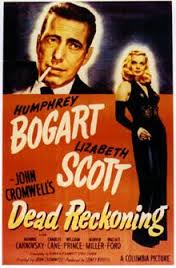
DEAD RECKONING
US, 1947, 100 minutes, Black and white.
Humphrey Bogart, Lizabeth Scott, Morris Carnovsky, Charles Cane, William Prince, Marvin Miller, Wallace Ford, James Best.
Directed by John Cromwell.
Dead Reckoning is an entertaining Humphrey Bogart vehicle. With its post-World War Two setting, it fits into the pattern of film noir that was so popular at that period: so many of the films with Dick Powell (Cornered, To the Ends of the Earth), Gilda, Out of the Past. Lizabeth Scott, early in her career, proves to be an effective femme fatale (in the Lauren Bacall vein). The film has the atmosphere of gangsters, easy money, betrayals. Direction is by John Cromwell, veteran director of a range of films from the 1937 Prisoner of Zenda to Abe Lincoln in Illinois, The Enchanted Cottage, The Goddess?
1. Interesting and entertaining? Film noir and the '40s?
2. Columbia and film noir: black and white photography, a look at America, light and darkness, good and evil? The atmospheric score?
3. The title, thriller, film noir? Audience response to themes, the ambiguities of values in the characters?
4. The structure of the film: the focus on Rip Murdoch, his going into the church, the priest? The voice-over technique? The comment, analysis, critique of what happened?
5. The situation, the war, Preston calling himself Drake, his heroism, the mission, the medal, being summoned to Washington? Caution, running away? His letter to Rip? The melodrama of his car accident death? The film as a puzzle? Whodunnit?
6. Humphrey Bogart as Rip? Friendship with Drake, knowing Corall Dusty from him? His pursuit of his friend, the commission from the army, going south, the hotel, the nightclub? Encountering Coral and hearing her song? Martinelli and his henchmen? Louie and his wanting to give him the letter? Rip as the loner, listening to the radio, hearing the police, going to the morgue to identify the body? Coral and forcing the truth from her? The gambling and the repayment? Coral's stories, wealth? Martinelli and drink? Knocking Rip out? Louie's death? The contact with Mc See and the safe-cracking? Coral and the drive, stopped by the police, the proposal of marriage? His disbelief about Coral? Her ringing the police? Caught by Martinelli, the smell of jasmine? Going to the priest? Coral's penthouse and the confrontation? Truth and the firing of the shot, Coral thinking she had killed him? The crash? Her death? Humphrey Bogart as the 1940s American screen hero, laconic with the touch of humour, a man of integrity?
7. The dramatic situation in the town: Johnny and Coral, professor, the murder and the blame? Coral's life? Martinelli and his hold? Crime and gamblers? Mystery? Coral and her gambling? Confronting Rip? The end and her firing, death?
8. Coral: Lizabeth Scott and her deep-throated blonde style, the photo, the song, grief? Gambling, the penthouse and the maid? In love, the speeding? Ringing the police to prove herself? The irony of the jasmine scent? Her double-dealing and lies, the truth, crash and death? The irony of 1Geronimo' as the password for the parachutists? Its ironic use?
9. The police, Rip tricking them, the investigations, his ways of eluding them? The morgue, the restaurant, the end?
10. Martinelli as villain? The world of mobsters? Power, control over women? The henchmen? Waiters? Safe-crackers?
11. The film's comment on post-war America, heroism and realism?
Published in Movie Reviews
Published in
Movie Reviews
Tagged under
Saturday, 18 September 2021 19:33
Dead of Night
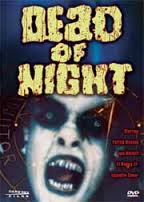
DEAD OF NIGHT
US, 1977, 75 minutes, Colour.
Joan Hackett, Ed Begley Jr, Anjanette Comer, Patrick Mac Nee, Elisha Cook.
Directed by Dan Curtis.
Dead of Night resembles the original British film of the same title which was a compendium of horror stories. This small group of stories, filmed in the mid-'70s, has a tale of mystery, of terror, of horror. They are all from the pen of Richard Matheson, veteran writer of such stories ranging from Roger Corman's adaptations of Poe to adaptations of the classic British horror stories like Dracula and Dr. Jekyll for director Dan Curtis.
The films range from time travel to a non-vampire thriller and to a ghost story. They are quite effective of their kind.
Second Chance: This is a story of time travel starring Ed Begley Jnr. It shows a car lover and his driving back 50 years. By chance he holds up somebody who takes his car. On return to the '70s, he discovers that he held up, and saved from death, the grandfather of the girl that he wants to marry. The grandfather also has the car and commissions him to clean it up and use it as he wishes. The film is a mild and pleasant time travel story with a few suspenseful touches.
There Is No Such Thing As A Vampire: This is an entertaining and very brief short story. Anjanette Comer is suffering from fear that she would be destroyed by a vampire. Her professor husband, Patrick Mac Nee, is most solicitous for her. He invites a young friend, Michael, played by Horst Buchholtz, to visit and tells him of the horrible story and the precautions that he has taken against the vampire, including garlic everywhere. The professor poisons Michael, takes some blood from his wife's neck and smears it on Michael and then puts him in a coffin in the attic. In the uproar in the morning, he persuades his servant, played by Elisha Cook, to transfix the vampire thus murdering his wife's lover. Effective of its kind.
Bobby: This is a ghost story where distraught Joan Hackett tries to conjure up the spirit of her drowned son. He arrives at the door, there are gentle sequences, he then starts to play games and it is soon revealed that he hated his mother. He terrorises her in rooms, in cars, with a knife. She shoots him but he returns and pushes her down the stairs and finally as a demon, kills her. A quite exciting short horror tale.
Published in Movie Reviews
Published in
Movie Reviews
Tagged under
Saturday, 18 September 2021 19:33
Dead Man's Folly

DEAD MAN'S FOLLY
US, 1986, 89 minutes, Colour.
Peter Ustinov, Jean Stapleton, Tim Piggott- Smith, Constance Cummings, Kenneth Cranham.
Directed by Clive Donner.
Dead Man's Folly is an Agatha Christie murder mystery with attractive English settings. It is an opportunity for Peter Ustinov to be Hercule Poirot once again (Evil Under the Sun, Death on the Nile, 13 at Dinner, Appointment with Death). Tim Piggott- Smith is rather good as his friend Hastings. Jean Stapleton enjoys herself as Mrs Ariadne Oliver, the novelist.
The film has all the popular Agatha Christie characters and ingredients, clues and murders, the resolution by Poirot. Direction is by Clive Donner who made a great variety of films from telling satires in the '60s including Nothing But The Best and Here We Go Round The Mulberry Bush to Alfred the Great and chic comedies like Vampyra. He also did adaptations of Dickens, including A Christmas Carol, to the television screen.
1. The popularity of Agatha Christie stories? Hercule Poirot?
2. The English setting, the countryside, the estate? The musical score?
3. The title and the reference to the folly? Its part in the plot? The murder hunt and the game? Characters, clues and explanations?
4. Jean Stapleton as Mrs Oliver, American gushing style, the meeting with Poirot, her fears, her character? The introductions, fears during the murder hunt, her eagerness for the solution?
5. Peter Ustinov as Poirot: type, in relationship to Agatha Christie's original? Skill at being a detective, vanity? Ingenuity? Friendship with Hastings? The introductions, his observing characters, succeeding in the murder hunt-, following up the clues, explaining the solution?
6. Hastings and his friendship with Poirot, support, clues?
7. Sir George, his manner, relationship with Hattie, aloof, a good swimmer? The murders, the revelation of the truth, his mother, his murdering his wife, his accomplice? Ruthlessness, army career? His fortune? The appropriate villain?
8. Hattie and her American style, glamour, vagueness? her presence during the carnival? The pretences? The truth, the tourist disguise, the murders? Her callousness?
9. The victims: the girl, the grandfather? Their knowledge about the family, blackmailing, the set-ups for their death? The family and the explanations?
10. Sally and Alec, his nuclear scientific background, presence at the estate, tensions, rivalries?
11. Michael as the architect, his disdain of the folly, flirting with Sally?
12. The secretary and her devotedness?
13. Eddie, the American background, his explanation of his presence, suspicions? The truth?
14. The mother, her friendliness with Poirot, her despair about human evil? Her knowledge of the truth? The exposure?
15. Agatha Christie's stories as puzzles, sufficient clues? Aspects of human nature?
Published in Movie Reviews
Published in
Movie Reviews
Tagged under
Saturday, 18 September 2021 19:33
Dead Man Out
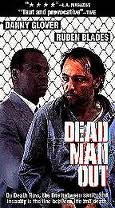
DEAD MAN OUT
US, 1898, 87 minutes, Colour.
Danny Glover, Ruben Blades, Sam Jackson.
Directed by Richard Pearce.
Dead Man Out is a telemovie made for home box office viewers. It is a serious look at prison life, psychological help for prisoners, mental stability and instability, capital punishment. The film is virtually a two-hander drama: a confrontation between a psychiatrist played by Danny Glover, and a condemned prisoner played by Reuben Blades. Tom Atkins is the warder.
The film is strong on dialogue, arguments pro and con the issues. It attempts to make abstract issues concrete. The film uses Montreal locations, especially for the prisons, and has particularly effective death row scenes, solitary sequences. capital punishment sequences.
Direction is by Richard Pearce, director of several telemovies and of films as diverse as Heartland and No Mercy with Richard Gere.
1. A prison film, capital punishment? Human dignity? Telemovie and its intended audience?
2. Montreal locations, the authentic prison, interiors and exteriors, the electric chair? Atmospheric score?
3. The title, expectations, the talk of the wardens at the time of executions and the dead man crossing the yard?
4. The film as a two-hander: a play, strong dialogue, situations secondary to dialogue? Psychological interaction? Themes?
5. Audience response to prisoners, their crimes, background, motivations, proportional punishments? The possibilities of rehabilitation, treatment? Solitary? The psyche of the prisoner? The need for human respect and the treatment of prisoners by society? The repercussions of prison life, death?
6. The portrait of the psychiatrist: entering the prison with him, his skills, motivation, hopes for rehabilitation, understanding of capital punishment? Questions of sanity - and sanity for being executed? His meeting the prisoner, watching him in the cage, assessing him? The number of interviews, the initial resistance, breakthroughs? Listening to the prisoner's story? His own responsibilities? The prisoner's relapse, the continued visits, transference experience? Concern, death row? The dilemma about the prisoner being sane or not - and being executed or not? His plea, the confrontation in the cell, the truth, the razor blade? In danger of death? The relationship with the warden, the warden's presence? Getting out of the cell? His watching the prisoner go to death, the break, the shooting? The effect of the experience on the psychiatrist? The audience sharing his perspective?
7. The prisoner in himself, the cell, the treatment, punishment within the prison, human dignity and lack of dignity? Forfeiting his life? In the death row? Alone, stripped, humiliated? His resistance? His background
and the murders, the encounters with the psychiatrist, resistance, arguments? Guilt and responsibility? Sanity and insanity? The effect on him? The friendship? His relapse and punishment? The sequence of the execution and its effect on him? The crisis In the cell, getting the blade, holding the psychiatrist to ransom? His going to execution, his running and being shot?
8. The warder, his control, the rules, approval of visits or not, handling crises?
9. The sketch of the staff, the wardens, attitudes towards prisoners, responsibilities? Supervision and security?
10. Death row, the picturing of the man going to execution, sitting in the chair, the reality of capital punishment?
11. Abstract themes of prison, crime, rehabilitation, execution? The characters dramatising these issues?
Published in Movie Reviews
Published in
Movie Reviews
Tagged under
Saturday, 18 September 2021 19:33
Deadly Silence, A
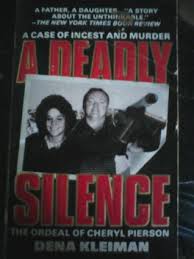
A DEADLY SILENCE
US, 1989, 96 minutes, Colour.
Mike Farrell, Charles Haid, Sally Struthers.
Directed by John Patterson.
A Deadly Silence is an American telemovie about incest. It has a strong message and a plea for communication with authorities when a child seems to be a victim of incest.
The film is based on a true story, a book and the court records and the trial of the central character. It begins with a collage of opinions about the situation: mainly disbelief. The film portrays the father, his death, the uncovering of the motivations of his daughter, the abuse, her suffering, her taking drastic action and the court case.
The film is well-acted: Charles Haid has a brief but emphatic role as the father, Mike Farrell is the lawyer. Heather Fairchild gives a persuasive performance as the abused, confused, self-centred Cheryl.
1. The impact of this telemovie, based on a true story, its themes, message?
2. Designed for a wide audience, the treatment of the issues for the television audience, the message, urging people to collaborate and help?
3. Long Island settings, suburbs, homes, courts?
4. The title: whose silence: Cheryl's, the family, friends?
5. The prologue and the indication of opinion about Cheryl]. and the situation:
the collage of photos and voices? Alerting audience attention?
6. Jim as an ordinary citizen, father, at home, the celebration of his birthday, friends, his treatment of his family, at work? Seeing him as tough, his ailing wife, her death and the funeral? His love for his daughters? His
severity with his son, the haircut, ousting him? Harsh comments? Discipline within the house? His death?
7. The police, their investigation? The detective and his work? The presumptions about Jim Jnr? The truth about Cheryl, the investigations? The lawyer, his relationship with Cheryl, helping, trying to understand, horrified, his special plea, discussions with psychologists?
8. The truth emerging in flashbacks? Cheryl, her story, relationship with her father over the years, the corroboration of others? At school? Her relationship with Rob, in love with him? The discussion with Sean about the killing? Biding her time? Her concern about Joanne? Her narrative of her relationship with her father, his treatment of her, her mother's awareness? Seeking opportunities? Cheryl's decision to kill her father, hiring Sean, the money? Her reaction, coldness, unemotional, saying the words about child abuse, her selfishness, defensiveness? The psychiatrists and their comment about this as her way of protecting herself? The pregnancy, the tests, Rob as the father? The doubt whether she was telling the truth? The film leaving this open?
9. Her aunt and her grandmother, their place in the household, helping, look after Cheryl and Joanne, their disbelief? The aunt and her concern, her believing the truth about her brother rather than her niece? The neighbours, their concern, the neighbour worried about Cheryl's behaviour?
10. Rob, in school, his support? in the court?
11. Sean, the idea of killing for hire, the money, his interest, the opportunity, his parents, the gun, the fact of shooting? His asking for more money, greed? Lack of conscience? The harsh sentence? The horror of this boy actually hiring himself out?
12. Cheryl, the jury, the letters written to the judge, the judge and his comment, sympathy to Cheryl in her plight, his saying that there were other means available? His sentence, her collapse, leaving in the police car? Her having to cope, the support of her brother? The reaction of the family? Joanne and her loving, despite the fact that she resented Cheryl killing her lather?
13. The point made that Cheryl did not have to act in this way, the film highlighting other ways of coping with incest?
Published in Movie Reviews
Published in
Movie Reviews
Tagged under
Saturday, 18 September 2021 19:33
Deadly Force
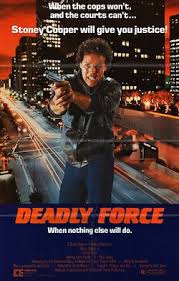
DEADLY FORCE
US, 1983, 95 minutes, Colour.
Wings Hauser, Joyce Ingalis, Paul Shenar.
Directed by Paul Aaron.
Deadly Force is a violent action film geared for cinemas - but is strongly reminiscent of a pilot for a television series. The television series, however, would have to be 'R' rated.
The film's plot is a familiar one: a murder, multiple murders - with a cover-up for the real murderer by killing others to distract the police. The incompetence of the police is highlighted - and the hero dismissed from the force for his violent and relentless tactics, comes to the rescue.
Wings Hauser (vice Squad) seems a very young hero for this kind of relentless violence. His wife (in the style of the times) is a television reporter. Paul Shenar (Orson Welles in The Night that Panicked America) is effective as the smooth-talking villain. There is a touch of explicit sex and some fast-paced violence. Otherwise, the material is regular television series. Direction is by Paul Aaron who directed such films as the Chuck Norris vehicle A Force of One. The film raises questions about justice, the effectiveness of the police, the hypocrisy of self-made American messiahs and their control - and the continued use of car chases, violence.
Published in Movie Reviews
Published in
Movie Reviews
Tagged under
Saturday, 18 September 2021 19:33
Deadly Illusion
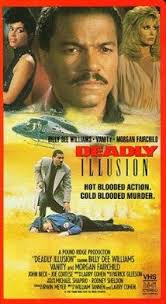
DEADLY ILLUSION
US, 1987, 89 minutes, Colour.
Billy Dee Williams, Vanity, Morgan Fairchild, John Beck.
Directed by William Tannen, Larry Cohen.
Deadly Illusion is a routine, interesting murder mystery in the New York affluent drug world. It was written by Larry Cohen (the It's Alive series, Demon, Private Files of J. Edgar Hoover, Q the Winged Monster). He also co-directed the film with William Tannen. It is a star vehicle for Billy Dee Williams who gives a lot of verve to his characterisation. Singer Vanity is in support, as is Morgan Fairchild as the proprietor of a modelling agency.
The Williams character is an ambiguous one, a freelancer, quick with a gun, with police connections. He is invited to commit a murder - but follows it through to uncover a tangle in a brutal drug world. The film is offering familiar material, does it with touches of brutality and crudeness. However, it is a kind of entertainment that was popular in the late '80s.
1. Murder mystery? Drug world? Heroics?
2. New York settings, the streets, buildings, TV and model agencies? The Shay stadium? Special effects and stunts? The score?
3. The title, the proposition of the murder, the deceit, untangling the web?
4. The prologue, Hamburger in the agency, the man pulling the gun and shooting, Hamburger's quick-wittedness, quick with the gun? heroics? Setting the tone for the film?
5. Billy Dee Williams as Hamburger, personal style, verve and charm? His relationship with Rina? Working together? Emotional bonds? The arrival of Burton and the proposal of the murder? His following through, the encounter with Mrs Burton, sexual liaison? The Irony of this being Jane Mallory? His following the clues, interviews with drug pushers? The truth about Burton? Going to Jane Mallory's office, the interview, the dinner date and the helicopter shooting? His discovering more of the truth? Finding Gloria, the explanation of her scar, sending her into safe protection? Interaction with the police? The chase in the building, the dead artist, his disrupting the fashion show, the death of the model? The police and his deal? The confrontation of Jane Mallory, her shooting Burton, with the gun at each other, his shooting her? The chase in Shay stadium with its drapes, the death of his friend? The resolution of the mystery, ringing up Rina?
6. Rina, relationship with Hamburger, helping him on the case, the chases, questionings?
7. Burton, the deceit, the proposition, drugs, the murder of Mrs Burton, the TV management, Hamburger interrupting the meeting with the gun, his going back to Jane, his death?
8. Jane Mallory, the model from childhood, her agency, staff, fashion show? Contacts for drugs, the models as couriers? Her disguise, the attempt to kill Hamburger, her suave manner, admitting the truth, the final showdown, her death?
9. Gloria, the truth about the models and the drugs, the accident, under safe protection, the drama in Shay stadium, the confrontation with the killer, the police?
10. The sketch of police work, investigations? Drug-runners and organisations in New York? A mirror of the crime world of the American city of the late '8OS?
Published in Movie Reviews
Published in
Movie Reviews
Tagged under
Saturday, 18 September 2021 19:33
Deadly Affair, The
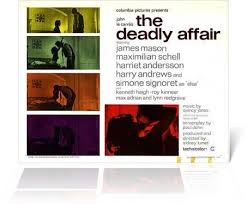
THE DEADLY AFFAIR
UK, 1966, 107 minutes, Colour.
James Mason, Simone Signoret, Maximilian Schell, Harriet Anderssen, Harry Andrews, Roy Kinnear, Max Adrian, Lynn Redgrave, Royal Shakespeare Company with David Warner, Michael Bryant.
Directed by Sidney Lumet.
The Deadly Affair was directed by Sidney Lumet. It was made in the mid-sixties, when Lumet had come to some kind of peak in his film-making with The Pawnbroker, The Hill, The Group. This film was not so popular although in retrospect it has been well praised. It may need to be seen in the light of Lumet's success in the mid-seventies with Network, Dog Day Afternoon and Serpico. James Mason has featured in a number of Lumet's films. He is excellent in the role of a man caught in a world of espionage and betrayal. A strong international cast including Maximilian Schell and Harriet Anderssen and Simone Signoret performed very well indeed. The film stands up well on its own, but it is also a sour and cynical commentary on the popularity of espionage films in the mid-sixties.
1. The significance of the title and its ambiguities? The focus on 'deadly' as a consequence of an affair?
2. The 1960's and the cinematic genre of spies? The reaction to the fantasy spy stories with pictures of bleak reality? The world of John Le Carre and his spies in the cold? How real a world of espionage was this? Audience response to the drab realistic world of espionage? How enjoyable are these bleak dramas?
3. The importance of the credits sequence and the relationship of husband and wife? The use of colour, dingy locations? London, business offices, theatre? The 60s style modern music?
4. The opening and its ambiguity? The conversation between Dobbs and the suspected man? The ambiguities as a basis for the plot complexities? How interesting and convincing were the complexities of the plot? The world of truth and lies, appearances and reality? The effect on Dobbs and on all the people concerned?
5. What kind of man was Dobbs? The ordinary public servant in the bowler hat? His doing his job properly? Interviewing suspects? Interviewing wives? His disillusionment with his job and the head officials? His relationship with his friend Dieter and the memories of the war and espionage well done? His relationship with the police and the investigation?
6. What motivated Dobbs to search out the tangle and seek the truth? The physical and mental suffering involved in seeking out the truth? His being bashed, worried, disillusioned with his wife and friend? His being physically sick in the theatre? The necessity of confronting Dieter with the truth? His trying to be gentle and finding that that did not work with his wife? The move to aggressiveness? What future did he have in regard to his work, relationship with his wife? How good a study of a person in the public service and espionage role?
7. Dobbs' wife and the complexities of her personality? His love for her, her taunting him, her flaunting of her affairs? The irony of her deadly affair with Dieter? His not loving her? Her disillusionment? Dobbs and his wife building at the end on the ruins of the affair?
8. The audience's response to Elsa? Her concentration camp background, her involvement in espionage? Her idealism and loyalty to him? Her truth and her lies? Her falling into the trap with Dieter? Her reaction to Dobbs and despising him? Her rebuking him about life and death and spying? The pathos of her feeling trapped in the theatre? The pathos of her death? How credible were she and her husband as spies?
9. The picture of the police in the person of Mendell? His idiosyncrasies with his animals, falling asleep, his seeking out of facts and not fiction? A light touch in this characterization, yet efficiency with his work, especially with the garage owner? The pathos of his death in the gutter?
10. The picture of espionage superiors and their manipulation? Their responsibility to government? Their imposing on their subordinates?
11. The picture of offices, files which could be raided, the world of cafes and raids into business offices? Dead bodies on lifts? Police following cars? Giving pursuers the slip?
12. The importance of the theatre sequences adding a different touch of flavour? The visit to the provincial theatre and the rehearsal of "Macbeth"? Virgin and her background in the theatre? Her giving vital information? The transition from the theatre in the provinces to the Royal Shakespeare Company? The performance of "Edward IV' and the betrayal and murder parallelling that in the audience?
13. The contribution of the chases, Scarr and the interlude with him in the cafe, the murders?
14. How well integrated by the end were the complexities of the plot, the characterizations? The appropriate climax with Dobbs confronting Dieter and Dieter's death? An exploration of human nature? The social and bleak world of the 20th century?
Published in Movie Reviews
Published in
Movie Reviews
Tagged under
Saturday, 18 September 2021 19:33
Deadline U.S.A.
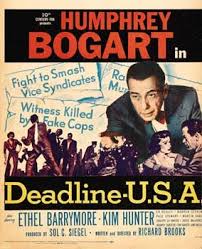
DEADLINE U.S.A.
US, 1952, 85 minutes, Black and White.
Humphrey Bogart, Ethel Barrymore, Kim Hunter, Ed Begley. Warren Stevens, Martin Gabel, Jim Backus, Paul Stewart.
Directed by Richard Brooks.
Deadline U.S.A. is an above average social drama, written and directed by Richard Brooks, who has directed (and frequently written) some very interesting films such as Cat on a Hot Tin Roof, Elmer Gantry, Lord Jim, The Professionals, In Cold Blood, The Happy Ending.
The film's main merits are a typical piece of Bogart casting and acting along with crisp and sardonically witty dialogue. This keeps the film moving and continually interesting. The social concern is also of interest. The tone is super-patriotic-American of the early 50's. Nobility, honesty, toughness of the old brigade are the hallmarks. Ethel Barrymore's performance reinforces these traits. This was the McCarthy? era and the film shows great faith in honesty
in social reform.
1. Why was this film something more than just a routine story of a newspaper and a newspaper man?
2. Did this picture of a huge American daily paper ring true to your impressions and experience of newspapers, their service to the community and performing some role as social conscience? Why?
3. Even though this film belongs to the early 501s, are the social issues it raises similar to the issues of our own day?
4. Were you convinced by the spirit of fellowship and drive amongst the staff of "The Day"? Especially at the wake, in the scenes of preparing copy?
5. What kind of a man was Hutchison? Was he real? Consider his dedication, his typical Bogart toughness, quick, sardonically humorous, honest, socially conscious. Does he represent the ideal newspaper man? How?
6. Was it relevant that Hutchison was divorced from his wife? Did it add anything to the film except some well-integrated psychological worry for Hutchison at the same time as tensions about the sale of the paper and the Rienzi case?
7. Was there anything wrong with the Garrison family selling the newspaper? Was it a necessary investment, or were they trying to kick their dead father? Why? (The daughters were made to look villains.)
8. Why did Mrs. Garrison wish to sell? Why did she change her mind? What kind of woman was she? was she presented as the feminine equivalent of Bogart? Why?
9. What kind of newspaper was "The Day"? How did it contrast with "The Standard"? (Bogart's criticism of people who want puzzles, comics, horoscopes and if they happen to stumble on the front page, they find nudes.) Did "The Day" have the right to investigate and expose Rienzi? To work without the police, to be a social conscience and to clean up the city? Why?
10. Was Rienzi just another crook or was he typical of big business gangsters who have so many strings to pull that they can't be touched by police?
11. Did you find the workings of the paper interesting? Did the paper have the right to interfere in people's lives - e.g. Warden? Hutchison seemed to have powers of life and death.
12. The film took a national scope with U.S.A. in the title. Did you find the film too nationalistic in outlook and tone - too patriotically American? It presented the ideal cinema hero and the great American virtues; the great American heroine who says she is more pliable than the younger generation who are more brittle and break more easily.
13. Did Norah's returning to Hutchison seem too sentimental? Was it necessary for the film? How well was it prepared for by Mrs. Garrison's talk about her own married life?
14. was it significant for the message of the film that we were not told about "The Day's" future?
15. What light do films like this throw on the social awareness of the 50's, especially considering that this was the McCarthy? period? The film speaks about freedom of the press, speaking out and about truth and criticism.
Published in Movie Reviews
Published in
Movie Reviews
Tagged under